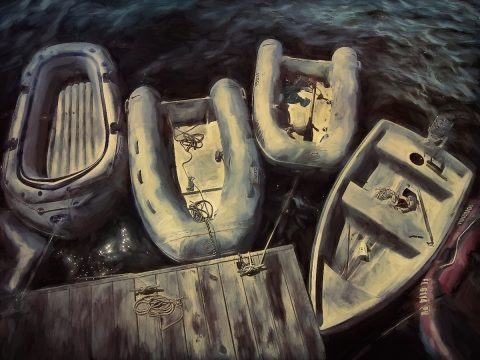You’ve allowed yourself to write a story that reflects real (hard) life authentically and quietly. What drew you to such a quiet narrative?
This story used to be louder. It was twelve pages long, and about a guy who’d lost his job and decided to camp out on his sister’s lawn and become a doomsday prophet. After a couple years and a few failed submission attempts, I decided to whittle down the original story since I still liked the idea of someone losing his job and deciding this was the next best option. The quiet side of the story came from the fact that I’m in Disability Studies, and have friends and family members who have experienced disability discrimination at work. It’s not something that many people choose to share with others, due to shame and stigma, and the difficulty in proving that discrimination happened. I’m also often struck by the number of things we don’t want to tell people who are close to us, since there is little our loved ones can do about the matter but worry. Also, sometimes we just don’t want to expend the emotional energy of telling someone about a painful subject. I think that results in a lot of important stories being quiet, or quieted.
So much is conveyed in the final gesture, the dumping of the cold coffee. I’m reminded of Jesus on the cross, asking God to take his cup away from him before giving in to God’s will. So is this an act of resignation, or is the rejection of the cup an act of defiance?
I see it as an act of frustration, and exhaustion with her current circumstances. The narrator knows she has to keep going, but at the moment she just doesn’t have the energy, or really want more energy. She needs a break, a respite, before she can refill that cup.
I wish I’d written this story, but I didn’t. Can you give me a good writing prompt?
This is one from poet Rachel McKibbens, and I’ve used in many classes. It works well for realistic or fabulist fiction or poetry:
Write a story or poem about a physical feature or talent. Make sure it is more of a pain than a brag, even though other people might see it as a wonderful trait. Why is it a nuisance? What hardships do you endure for carrying this thing or having this talent? What easy chore is made hard because of it? What can you do that no one else can? Who passed it down to you?
You once made a terrible headache of mine go away with Reiki, which seemed to involve stirring up energy and pulling the negative energy away. Where does all the bad energy go? Please tell me my headache didn’t end up hurting a nice family like this. And is there any link for you between Reiki and writing?
I’m sure there are different interpretations of what happens when doing Reiki, but I see it not so much as taking away negative energy—I can’t imagine you as ever having negative energy, Karen—but Reiki helps to do away with any energy blocks, much like unblocking an artery. Never fear, your headache was not transferred to any innocents ….
I’ve never considered a connection between my writing and Reiki, but I can see a parallel in terms of caring about and empathizing with people. I love sorting through difficult problems in my writing, the sometimes ethically and morally gray areas that come with being human. I think that process helps me, and hopefully the reader, understand more about the human condition, and it also involves a great deal of trying to empathize with my characters. That same kind of empathy is reflected in my Reiki practice, but also since I work with words all day and people who exist only in my mind, it’s gratifying to work with real human beings and offer something that will hopefully make them feel better. Reiki is also reciprocal in nature, and often I feel better after having worked with someone since it seems to improve my energy flow, too. Fiction writing is great, but a bit short on that kind of immediate gratification.
I also know you as an avid walker. Are there ways in which walking contributes to your writing, either the thinking process or the observational one?
I am often thinking about stories as I walk, especially after I’ve worked on a passage for a couple hours and need break. Some of my best ideas and insights happen when I can separate myself from the story for a walk. Similar to Reiki, walks are helpful in “unblocking” my train of thought and help me consider ideas, character actions, and aspects of the story I didn’t realize before. Walking and coffee are the two parts of my writing practice I can’t do without, and each is energizing in its own way.



 The SmokeLong Grand Micro Contest (The Mikey) is now an annual competition celebrating and compensating the best micro fiction and nonfiction online.
The SmokeLong Grand Micro Contest (The Mikey) is now an annual competition celebrating and compensating the best micro fiction and nonfiction online.